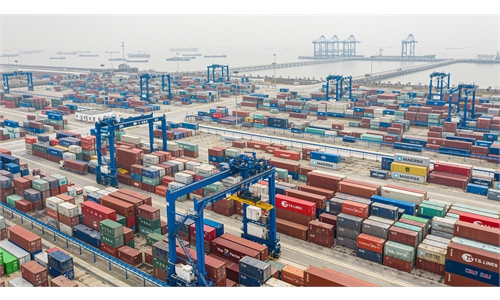
Illustration: Chen Xia/GT
In the context of ongoing regional conflicts in various parts of the world, Europe is currently witnessing different ideological narratives. Germany is no exception. This has influenced the discussions on China-Germany relations in Germany. Some German politicians' obsession with ideology and values has led to a serious detachment from reality in their understanding of China. Under their influence and manipulation, the voices of "demonizing China" have gained more traction in Germany than ever before.However, the history of people-to-people exchanges between China and Germany is long-standing, and cultural exchanges have always played a role in enhancing friendship between the Chinese and German people and deepening bilateral relations.
At the beginning of 2024, the German Academic Exchange Service (DAAD), as the world's largest funding organization for the international exchange of students and researchers, released a position paper titled "Realistically shaping scientific cooperation with China." In this paper, the center clearly expresses its desire to establish a balanced, mutually beneficial and pragmatic higher education exchange and cooperation relationship with China. In the current discussion on China-Germany relations, in which "demonizing China" has become the norm, this can be seen as a rational signal.
As a major country in higher education, science and innovation, China has developed rapidly in the past few decades and has become an important partner of the German scientific community in many fields. China has more than 3,000 universities, with a student population about 46 million, and an increasing number of young people are applying for science, technology, engineering and mathematics (STEM).
The DAAD explicitly states that "China has developed into a successful scientific nation and is now a world leader in some areas." Maintaining access to Chinese institutions, as important players in the international science system, can make well-founded assessments in order to avoid risks, and German scholars should participate more in knowledge production in China and benefit from it.
Of course, we also need to see the current situation and obstacles faced by China-Germany higher education cooperation. The cooperation projects between Chinese and German universities have decreased due to the influence of geopolitical conflicts, the pandemic and the demonization of China by German politicians and media. Before the pandemic, Chinese students constituted the largest group of foreign students in Germany. Now, the number of Indian students has surpassed the number of Chinese students.
Although the DAAD favors a realpolitik approach, which also forms the basis of the German government's China strategy, it believes that a balance should be struck in policy-making. DAAD emphasizes that the risks of non-cooperation should always be considered when weighing whether to cooperate with Chinese universities on a specific project.
Regarding the issue of accepting Chinese students, I feel that many German scholars and universities agree with the DAAD's position. They believe that Chinese students are an integrated part of the internationalization on the campuses of German universities. Chinese students are generally hardworking and academically excellent, enriching the diversity of the student population in German universities. After completing their studies, most of them become bridges and partners for China-Germany cooperation. German universities should continue to open their doors and welcome Chinese students.
Adopting a passive-defensive attitude in higher education cooperation with China is a mistake. Taking an active approach is the right path.
In today's era of globalization, facing setbacks such as the resurgence of trade protectionism, the proliferation of populism, and increasing risks of war and global governance deficits, promoting China-Germany cultural cooperation is more urgent and necessary than ever before.
Firstly, this cooperation can inject stability into the international situation and restore confidence in the world. Secondly, China-Germany educational cooperation is an investment in the future - an investment in peace, progress and sustainability. Thirdly, the cooperation between China and Germany, two major education and technology powers, can make extraordinary contributions to the knowledge production that benefits all of humanity.
The author is the executive vice dean of the Academy of Regional and Global Governance at Beijing Foreign Studies University. opinion@globaltimes.com.cn


